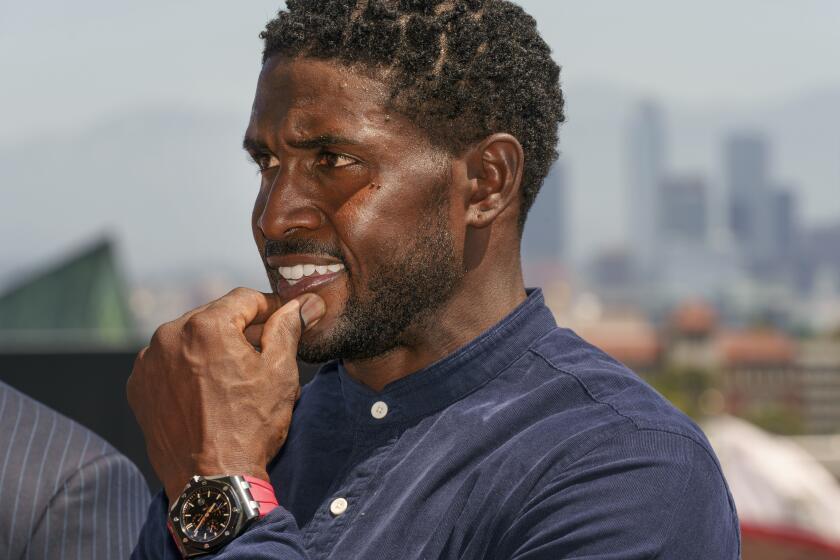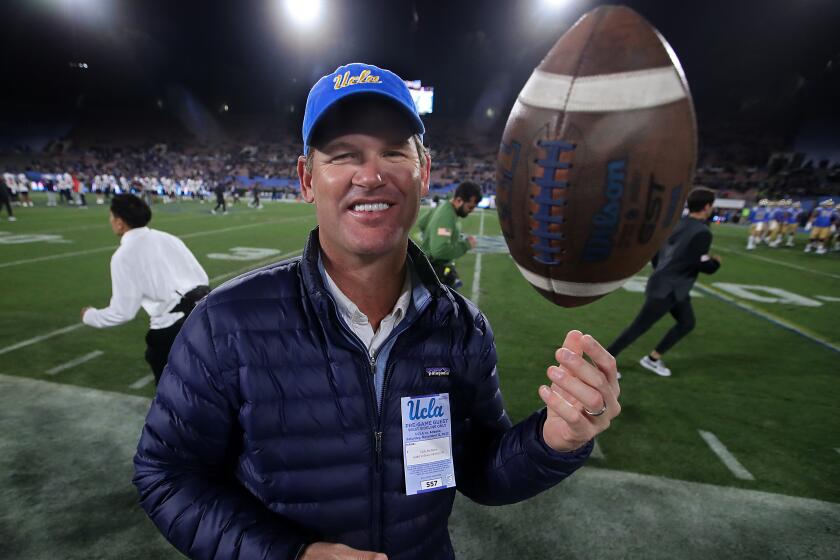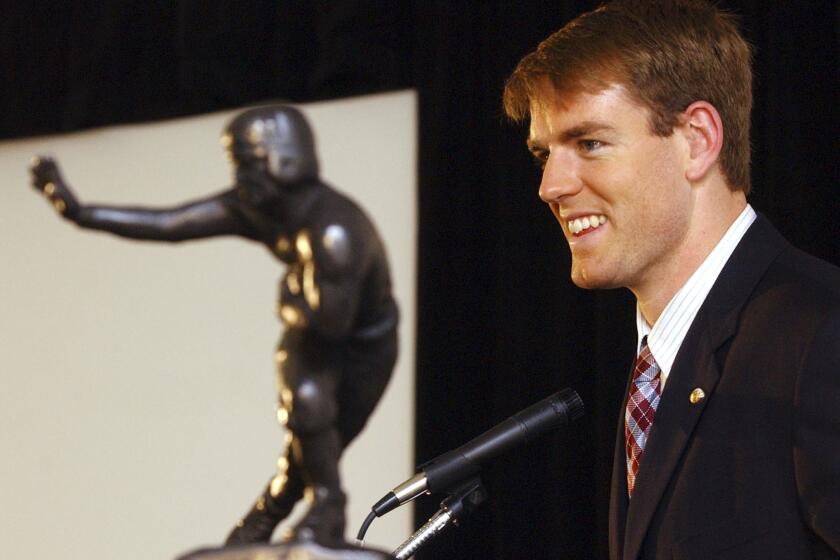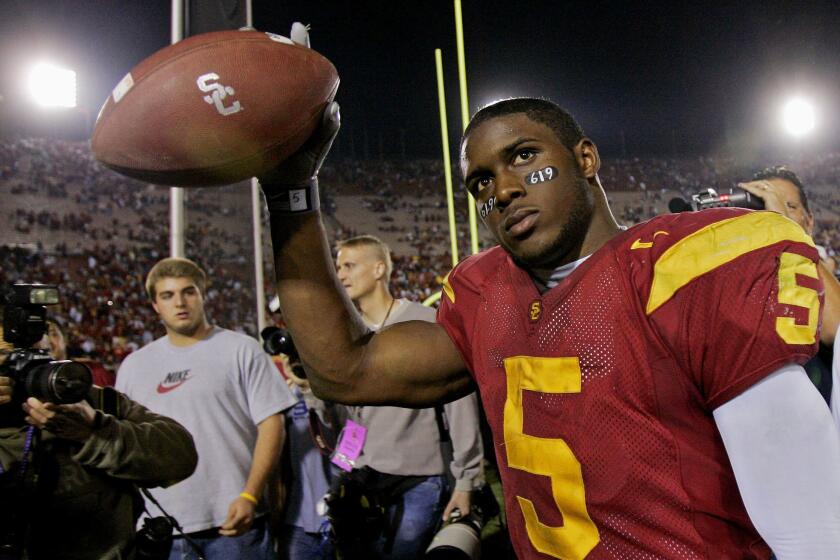USC football recruiters haven’t been doing enough legwork
The endings of USC’s last two games were strikingly similar, the Trojans losing to Washington and Stanford on last-second field goals.
And the kickers delivering the decisive blows share more than a knack for coming through in the clutch: Both are from Southern California, a region where USC has often dominated in recruiting.
Washington’s Erik Folk, whose kicks have defeated USC two years in a row, attended Sherman Oaks Notre Dame High. Nate Whitaker is from San Diego St. Augustine High.
Neither was offered a scholarship to USC.
That, however, does not make them unique.
For all the success enjoyed by USC on the field and the recruiting front during the Pete Carroll era, the coaching staff rarely offered scholarships to high school kickers. Instead, it typically brought in junior-college transfers or awarded scholarships to walk-ons if they earned the starting job.
Joe Houston, a fifth-year senior, was a JC transfer and in his third season as a Trojans walk-on before he was given a scholarship by USC Coach Lane Kiffin in August.
Houston’s struggles — he is two for six on field-goal attempts, among them a crucial fourth-quarter miss against Washington — and the dramatic finishes of the last two games have focused attention on a position seemingly viewed as an afterthought by the Trojans.
“During the Matt Leinart and Reggie Bush days, I think they thought, ‘All we need to do is get a guy to kick extra points. Why do we need a kicker who can make a game-winning field goal?’” said Greg Biggins, West Coast recruiting analyst for ESPNRise.com.
Kiffin and defensive line coach Ed Orgeron were the recruiting coordinators during much of the Carroll era. Since their January return — Orgeron now is defensive coordinator and recruiting coordinator — they have signaled a philosophical shift, mainly because of Kiffin’s hiring of John Baxter as special teams coordinator.
Baxter, considered an innovator during 13 seasons at Fresno State, said kickers, punters and snappers no longer will be given short shrift by USC recruiters.
“If you’re going to go out and get the best quarterbacks, the best running backs and the best players at all the other positions, why wouldn’t you do the same with your specialists?” Baxter said.
To that end, the Trojans already have received a verbal commitment from Andre Heidari of Bakersfield Stockdale High, a senior regarded by some as the nation’s top kicking prospect.
“When [Baxter] got here, he said, ‘It’s going to be different. I’m going to sign guys early and hand-pick guys I want,’” said former UCLA kicker Chris Sailer, a 1997 All-American who runs camps and clinics and privately tutors many of the nation’s top kickers.
USC’s previous strategy, Sailer said, was to make late offers to kickers, if it made any, leaving potential standouts wondering how much the Trojans really wanted them.
Some of USC’s approach to kickers predates Carroll.
Consider:
No Trojan has won the Lou Groza award, presented annually to the nation’s top kicker.
No USC kicker who did not play another position has been named to an All-America team.
Only two Trojans kickers — Chris Limahelu in 1974 and David Buehler in 2008 — were selected all-conference by league coaches.
Only two Trojans have been selected as kickers in the NFL draft, Cole Ford in 1995 by the Pittsburgh Steelers and Buehler in 2009 by the Dallas Cowboys.
UCLA, by contrast, has had nine all-conference kickers, six All-Americans and five NFL draft picks.
The Bruins’ Kai Forbath, the 2009 Groza Award winner, played at Sherman Oaks Notre Dame, but the talent overlooked by USC has extended to other parts of Southern California as well.
Arizona State’s Thomas Weber, the 2007 winner, graduated from Los Angeles Loyola. And 2005 winner Alexis Serna of Oregon State prepped at Fontana Miller.
The imbalance could change with Kiffin’s hiring of Baxter.
For most of Carroll’s nine seasons, during which the Trojans won seven consecutive Pacific 10 Conference titles and two national championships, a position coach who already had other responsibilities was designated the special teams coordinator. That coach and other assistants oversaw various units.
In 2008, Carroll hired former NFL coach Pete Rodriguez as a special teams consultant. But Carroll was later found to have violated NCAA rules by utilizing Rodriguez as a coach. Brian Schneider, part of Kiffin’s Oakland Raiders staff in 2007 and 2008, was hired by Carroll as special teams coordinator in 2009.
Only one high school kicker — Troy Van Blarcom — came to USC on scholarship during Carroll’s tenure.
JC transfer Ryan Killeen, brought in to handle kickoffs, supplanted JC transfer David Davis early in the 2002 season and held the job for most of three seasons. The late Mario Danelo was a former walk-on who beat out the erratic Van Blarcom for field-goal duties and set records for the Trojans in 2005 and 2006.
Like Killeen, Buehler was a JC transfer brought in to handle kickoffs. Buehler took on field goals after Danelo’s death in January 2007 and was a dependable starter in 2007 and 2008.
Last season, JC transfer Jake Harfman was awarded a scholarship to punt and handle kickoffs. Nebraska transfer and former walk-on Jordan Congdon earned a scholarship to kick field goals by beating out Harfman and Houston.
Houston, a 2008 transfer from El Camino College, beat out Harfman for the field-goal role in training camp this year.
Despite NCAA sanctions that will limit the number of scholarships USC can offer, Baxter says that he intends to bring in a new kicker on scholarship every few years to ensure depth and give specialists time to acclimate.
In the meantime, he is confident that Houston can overcome early struggles and become a dependable option.
And perhaps put USC on the winning end of a last-second field goal.
gary.klein@latimes.com
twitter.com/latimesklein
Go beyond the scoreboard
Get the latest on L.A.'s teams in the daily Sports Report newsletter.
You may occasionally receive promotional content from the Los Angeles Times.




